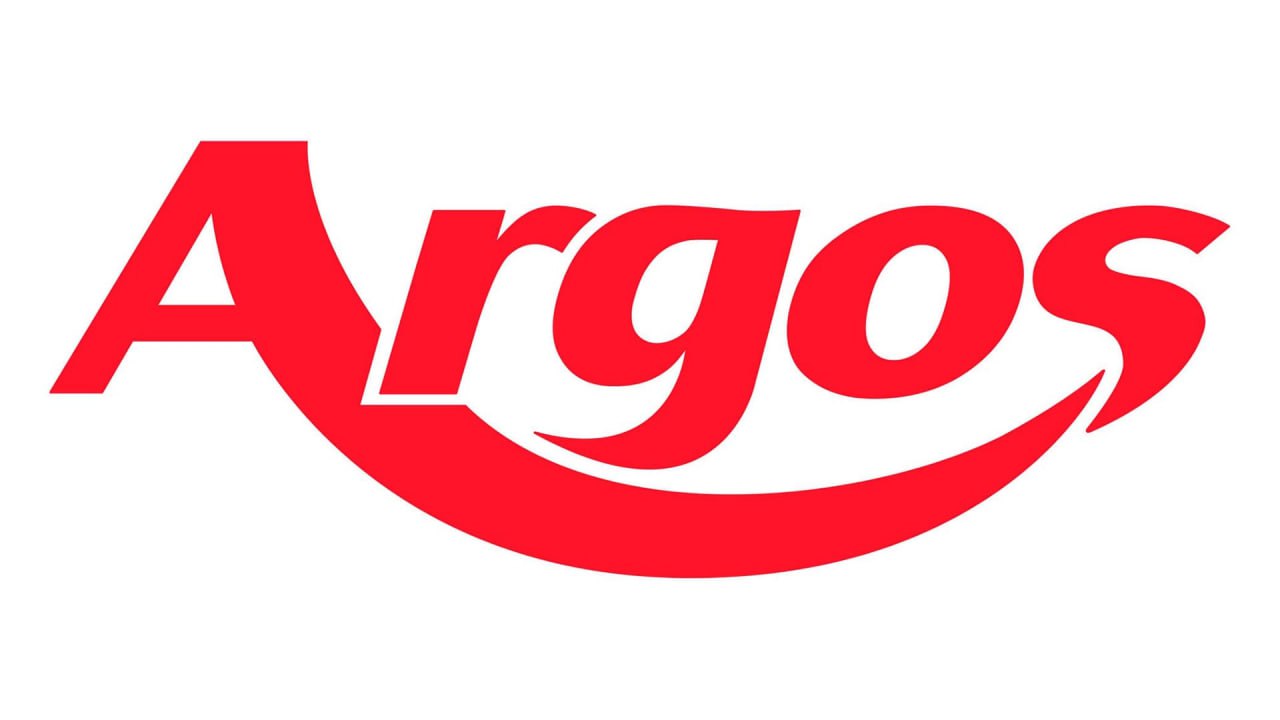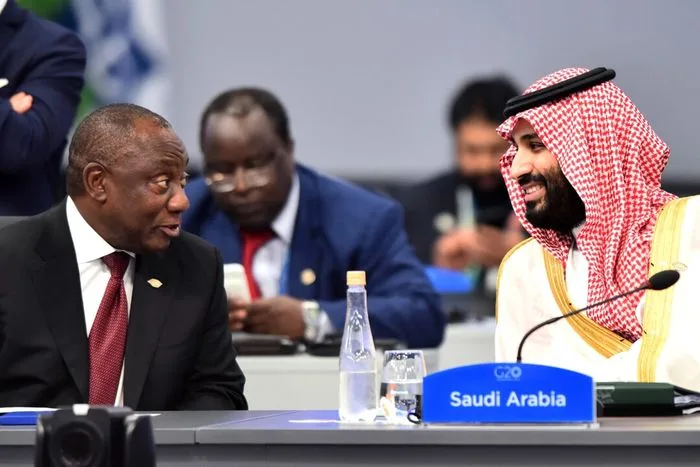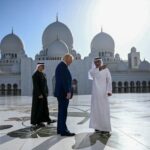By Darren Taylor
JOHANNESBURG – The United States and China face increased competition in Africa from so-called middle powers, notably the Kingdom of Saudi Arabia (KSA), which is rapidly expanding its economic and military presence on the continent, analysts say.
Often cited as Washington’s main ally in the Arab world and a moderate counterbalance to the extremist Iran, Riyadh is joining the battle for Africa’s resources by opening embassies across the continent, investing billions of dollars in infrastructure, and forming strategic partnerships with African powers, say foreign policy experts.
International relations analysts say the KSA wants to back up its investments and “soft power” efforts in Africa with a military base in the small country of Djibouti in the Horn of Africa, and with a port in Eritrea, both just a short trip across the Red Sea.
Prince Mohammed bin Salman, Saudi Arabia’s de facto ruler, has repeatedly referred to Africa as central to his country’s push to reduce its reliance on oil revenue, and to fulfil his “Vision2030” development plan.
In terms of this, the KSA will invest at least $41 billion in Africa in the next five years.
In research published in July, the Africa Center for Strategic Studies in Washington said the Arab world’s unprecedented focus on Africa is driven by economic interests, rivalries, and the ambitions of the United Arab Emirates (UAE), Saudi Arabia, and Turkey to be dominant regional powers.
The think tank said the Gulf states and Ankara are now leading sources of capital, private sector engagement, and weapons flows into Africa.
Recent investment in East Africa alone from these players, according to the center, amounts to at least $75 billion.
“These Gulf states and Turkey, thus, have become increasingly intertwined with the economies, port operations, politics, and security forces of East Africa—with far-reaching implications for the region’s roughly 415 million citizens,” said the think tank.
Geopolitical influence is another factor feeding the KSA’s interest in Africa, said analysts.
“The world’s hunger for critical minerals is sending trillions of dollars Africa’s way, and with that comes greater industrialization,” Chief Executive of the South African Institute of International Affairs Elizabeth Sidiropolous told The Epoch Times. “With more economic power comes more political power, and Africa is expected to have a much greater say over global affairs very soon, with strong representation on the [United Nations] Security Council, for example. In the very near future, it’s going to be very advantageous to be friends with Africa.”
She said the rise of “middle power” investment in Africa, from the likes of the KSA, UAE, and Turkey, “means Africa becomes less reliant on great powers like the United States, China, and Europe, at a time when the great powers are pulling back from Africa, except in the area of critical minerals.
“With U.S. President Donald Trump having withdrawn financial aid to Africa, the Saudis and others are stepping in to fill the hole, and also promising huge investments in mining, technology, and agriculture.”
Key to the KSA’s growing influence in Africa is its preference for “relationship-driven diplomacy,” said Ronak Gopaldas, senior analyst at Signal Risk consultancy in Cape Town.
“African leaders like the respectful way the Saudis do business,” he told The Epoch Times. “They’re winning fans in Africa, also because they offer financing with less conditions. It helps also that they’re building roads, hospitals, and bridges all over the place.”
Fatima Seedat, co-director of the Center for Contemporary Islam at the University of Cape Town, said “an important point of connection” between Arabs and Africans is that “they don’t mind taking time” to reach deals.
“Westerners often think that Africans are too slow, and they want to sign deals immediately. They don’t realize that it’s the lack of speed that sometimes builds trust,” she told The Epoch Times.
Hussam Algheraimil, the KSA’s commercial attaché in Johannesburg, said Riyadh is “involved in a dramatic upscale” of its presence in Africa.
“We plan to soon have 40 embassies in Africa; we now have only 27,” Algheraimil told The Epoch Times. “These offices and diplomats will be our route to more engagement. Africa is very high up as a priority in the Saudi foreign policy, and to our plans for diversified trade.”
Seedat said “the uncertain climate created by changes in things like American policy” is driving countries, including Saudi Arabia, towards more trade and investment in Africa.
Riyadh, said Algheraimil, is interested in making small investments in “microbusinesses” in Africa, and also in financing “mega” infrastructure projects.
“We are supporting small business across East Africa, but we are also building ports, and we are already the largest private renewable energy investor in Africa, with more than 7 billion dollars invested,” in the last few years, he said.
South African energy analyst, Ted Blom, told The Epoch Times the KSA is funding “green energy” in Africa “for strategic reasons.”
“It’s one of the countries that wants to spearhead global energy diplomacy. It’s using Africa for experience in the sector as an international operator across the energy value chain,” he said. “Saudi Arabia is doing very well in using Africa to develop a new set of skills and knowledge in its efforts to reduce dependence on its oil.”
Blom said Africa’s abundant solar, wind, and hydropower resources are “perfect” for the KSA’s plans to test renewable energy technologies until they’re ready for export and to use domestically.
Sidiropolous said access to critical minerals is a clear priority for Riyadh.
“Like everyone else, the Saudis need these for technological and economic development. Critical minerals are central to the Saudi plan to create a ‘Super Region’ of the oil-producing Middle East and Africa, where about a third of the world’s critical minerals are to be found,” she explained. “The Saudis want to position themselves as important investors in this, again with the aim of gaining preferential access.”
Sidiropolous identified critical minerals as “the foundation” for long-term Saudi-Africa partnerships.
“The Saudis are getting more into mining, for sure,” she said. “Minerals are vital to their strategy to be a leader in AI [artificial intelligence] technologies.”

Unlike China, which controls a lot of mining in Africa, said Sidiropolous, the Saudis are willing to help Africans become more self-sufficient in terms of processing and profiting from their own minerals.
Gopaldas said Saudi Arabia’s “patient approach, led by investments and not short-term victories,” is appreciated in Africa.
He noted an investment by Riyadh of almost $5.5 billion for the development of a platinum smelter and metals refinery in South Africa’s Limpopo province.
Gopaldas said the Saudis are investing billions in building ports on Africa’s east coast.
“This is so trade routes across the Red Sea are secured,” he said.
Algheraimil referred to his government’s reconstruction of the Assab port in Eritrea.
“We think this port is very strategically located. It’s near the Bab el-Mandeb Strait. That makes it very important for [maritime] trade and security,” he said. Bab el-Mandeb Strait is a crucial chokepoint between Yemen and Eritrea, connecting the Red Sea to the Gulf of Aden.
The Africa Center for Strategic Studies identified tiny Djibouti, population 1 million, as the “locus” of Saudi Arabia’s engagements in Africa.
It said the KSA’s $13 billion worth of investments so far here represent “90 percent of all Gulf state actor financial inflows in the country, highlighting Riyadh’s vision of Djibouti as a gateway for expanded ties in East Africa.”
Blom said the Saudi interest in Djibouti showed that Riyadh still has a “thirst for oil” despite its ambitions in the field of renewable energy.

“Most of its investments in Djibouti are in one of Africa’s biggest oil refineries that will likely end up producing at least 300,000 barrels per day,” he said.
Riyadh is also building the “Saudi Logistics City” in Djibouti, said Algheraimil.
In June 2024, a Saudi government statement noted: “The logistics city will enable Saudi products and exports to reach all African countries through Djibouti Port, which serves as a gateway to Africa and an important hub for economic and commercial exchanges both in Africa and globally.”
Algheraimil said his government has been negotiating with Djibouti to establish a military base there since 2017.
“Progress may seem slow on this front, but the talks are going well,” he stated.
Wandile Sihlobo, a South Africa-based agricultural economist, told The Epoch Times the Saudis are putting big money into crop and livestock production in Africa as they want to use the continent as a “food basket.”
“We must remember, only 1.6 percent of the territory of Saudi Arabia is suitable for agriculture. In Africa, large-scale, commercial farming is non-existent except for a few countries like South Africa and Kenya,” he said.
“Sudan, for example, if agriculture develops to even half its potential, it could become a very large global food producer, let alone just for the Saudis. That’s why we see the Saudis investing a lot in Sudanese agriculture, even though the country is full of conflict.”
Gopaldas said the Saudis and UAE have invested more than $400 million just in Sudan’s agricultural sector in the last three years.
“The Kingdom has also put millions of dollars in agricultural projects across East Africa, like Kenya, Uganda, and Tanzania,” he pointed out.
Gopaldas added that a looming labor shortage in the KSA is also an important factor in its strategy in Africa.
“Millions of young, unemployed Africans, a wealth of unexplored potential, all just across the sea,” he said. “The Saudis are promising training in AI, and Africans have expressed immense interest in this.”
Sidiropolous said Riyadh is building roads, hospitals, schools, and communications infrastructure in 11 countries in East Africa.
He said it’s to the KSA’s advantage that it doesn’t “carry the baggage that some others carry in Africa.”
Algheraimil also said his government “isn’t in Africa to outcompete” other powers seeking more influence on the continent.
“We are doing things in Africa in the Saudi way,” he stated.






